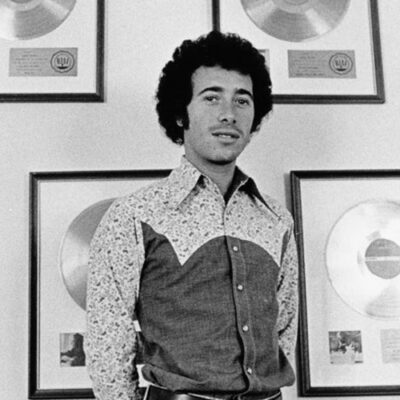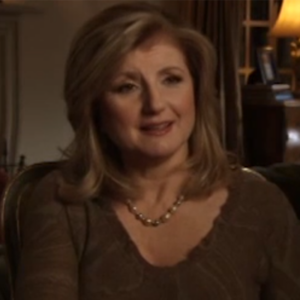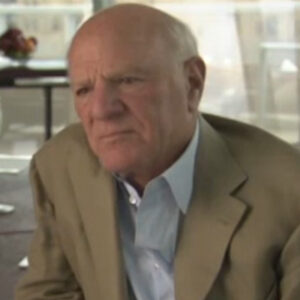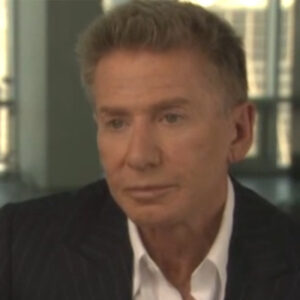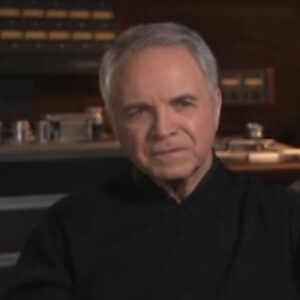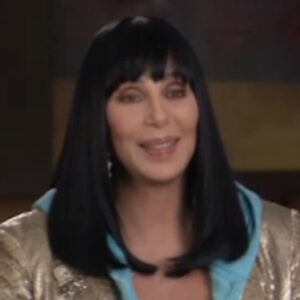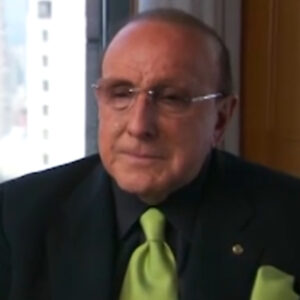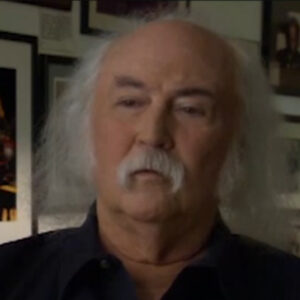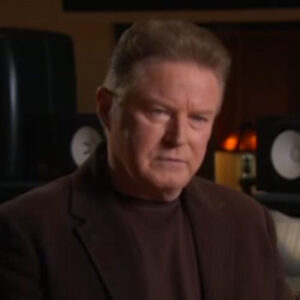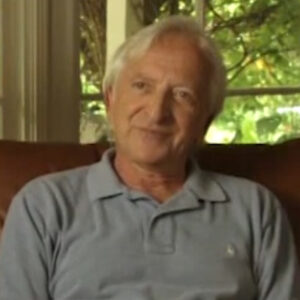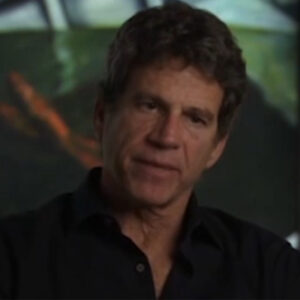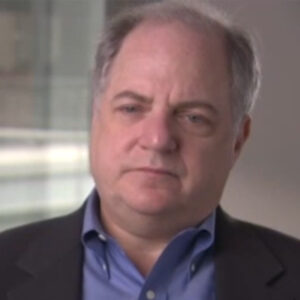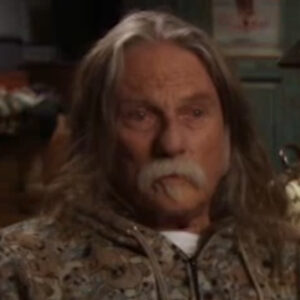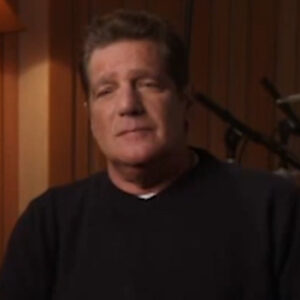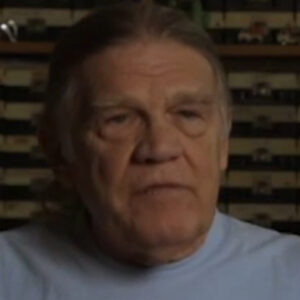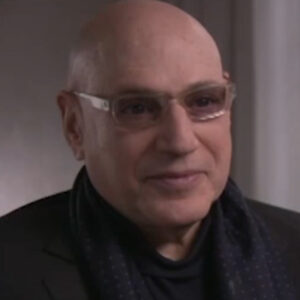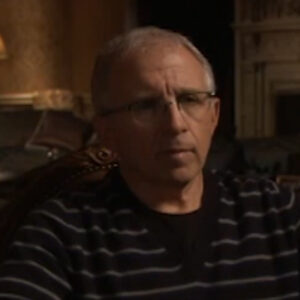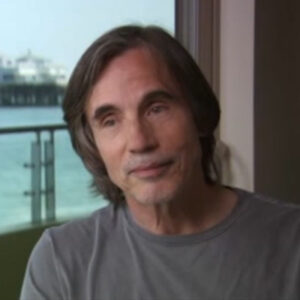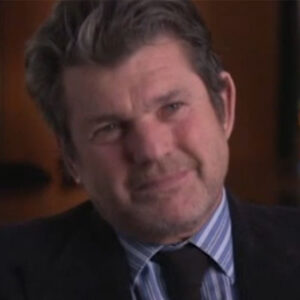Speaker But, you know, he deserves it all.
Speaker Yeah, yeah.
Speaker So let’s let’s just go right to the beginning here. How did you first meet and then what were your impressions?
Speaker Well, I as a fan of music and the music business, I I’ve kind of followed his career from the time I was very little. In fact, I had sent him a letter when I was 14 years old and said that I wanted to come to work for him. And I knew at that time that he was something really special and he was building a label that I loved and, you know, is still asylum records, one of the great labels ever been built. And I always thought, wow, if there was anybody that, you know, really understood the merger of art and commerce, that it was David and and so cut to later in my life, you know, I I was doing an R and signing bands and making records and helping artists grow.
Speaker And he was getting ready to start Geffen Records and and he called and we got together and talked about doing something together and ended up over time, ended up, you know, me heading over there.
Speaker Forget it. Is it true that you actually vote? Do you?
Speaker It is absolutely true. Yeah. When I wrote in the letter that I wrote him, I said that I would come over and do anything, that I would sweep his floors, that I. I had I had been collecting records since the time I was about eleven and I was kind of really taken by music and it was what I really wanted to do my life. I already knew that it was what I wanted to do. And living in California, asylum being an absolutely burgeoning Southern California, you know, label I. There was no one I wanted to learn from more than him. Little did I know that I would get the opportunity to learn from him later in my life. But at that young age, I would have gone. And if he called and said, come see my flaws, I would have done it.
Speaker Did he respond to your letter? No, he did not. But his his longtime assistant, Linda, remembered the letter.
Speaker Her name is Linda. But she seems to be so grand at this point.
Speaker I don’t know what I’m allowed to say. I don’t know what stuff you’re keeping and what stuff you keep out.
Speaker But I can I’m very careful to be good. But Linda just doesn’t exist anymore.
Speaker No, no, that didn’t go well.
Speaker Tell me what it was like to work with.
Speaker Well, I was actually thinking about it today when knowing that you were coming over and David was just the most exhilarating person to be around on a daily basis.
Speaker He.
Speaker He so cut to the chase of what we wanted to try and accomplish every day. And for me, I always got up very early in the morning and still get up early in the morning. And David gets up very early in the morning.
Speaker And so oftentimes we talk early in the morning and kind of see what we’re both doing and kind of set an agenda and just go out there and try and take over the world and and his.
Speaker Intelligence is only outmatched by his his desire and his wonder of what’s possible. And so to work for somebody like that who not only is desirous and ambitious of, you know, being very successful, but also has intelligence with which to get there and the wonder of still of a little boy. And in business and in music of really trying to figure out how to how to how to in some sense change the world in his own little way was just just exhilarating on a daily basis.
Speaker Now, when you came here. Yes. When you came. Well, I think I. A few years.
Speaker I think it was just before the second year. That’s the end of the second year. I think they’d been there a couple of years. And in fact, I think the first time I was there was the second year Christmas party. And. It was a label that had come out with a flourish. You know, they had had some success early on.
Speaker And the unfortunate passing of John Lennon, you know, made the the.
Speaker That was it turned out to be a very successful record for them.
Speaker And then there were a lot of other things. There was Elton John and Donna Summer and all these things.
Speaker And I think David knew instinctually that that what he really needed to do was build a kadry of new artists that, you know, it needed to be Frasch, it needed to be exciting and need to be on the cutting edge. And I think, you know, at that time, I was one of people was brought in to do that.
Speaker And I think it was there was all this excitement and anticipation in the air of what could be. And I think that I think everybody knew David was going to be successful.
Speaker And I think that, you know, now was going to start a new chapter.
Speaker And I don’t think it was just because of me. But it was other people that were coming aboard. And, you know, and that’s what it was.
Speaker It was it was it was a little bit of a lull, but kind of the calm before the storm.
Speaker When he heard.
Speaker Easier. He realistically won’t make any sense.
Speaker Yeah. So, um. Yeah. Part of. Sure. I think that.
Speaker You know, there was a point at which David was so smart that he knew that it wasn’t his ear at the time that would be, you know, a reflection of what kids would want, you know, kind of an up to date.
Speaker Strangely enough, Davis, David’s aesthetic musically are architecturally is better than just about anyone I’ve ever met in my life. So he could still today find an act that would be successful. I’m 1000 percent sure of it. But I think in that day, he knew enough to say, I need to surround myself with the best group of young and R people I can get to try and find the talent that takes this company and leads it into, you know, a new era and not put it upon him to be the one to have to make a decision about whether something’s good or bad.
Speaker So he hires you and he says, I’m giving you complete free rein. Yeah, well, I mean, he he.
Speaker He is absolutely the best boss in that way, right?
Speaker Because he says, I’m gonna give you complete free reign. Go do whatever you want to do. You need to not only find the right artist that you want, but you need to then make the records and then bring them in the company and break them in the company like it’s your job. I don’t want to hear any of your nonsense. Don’t whine to me. Make it happen. Right. And. And then if you bring him something, you say, OK. This is what I’m gonna do, is that I hate that. Don’t do that. Right. And it wasn’t like. You can’t do it. It was like you need to think about this more. Right. And but I never once ever walked into his office and said, I’m doing this. This is why I’m doing it. You know, I need your help. And this is my vision for it. He never once said, get out of here. We’re not doing it. Never once. So, you know, you have to have Davidsen inherent belief. Right.
Speaker Which is so much a big problem with just executives and the world, is that he is always felt like I want the best people around me.
Speaker And and if any of them think they’re better than me or they want my job, come and get it right. Give me everything you got. Right. Because he was never afraid. Right. And oftentimes executives are afraid of people that are around them that are unbelievably intelligent for fear of their own job or fear of their not looking as intelligent or whatever. No fear. David, like, come and get it. Let’s go now and every day. Bring it every day.
Speaker We’ve probably cheated people the way he wants to be treated this way. He was always the smartest guy.
Speaker Yeah. Yeah.
Speaker I was never in a room where anyone was ever smarter. Ever. Never one time. And he I think he probably would want to have been treated the same way, you know. And and I think his, you know, his his his absolute desire to let people go out, hire the best people, let them go out there and do what they do is unmatched. And I’ve never seen anything like it in the music business.
Speaker So you give me a green light from him to say it wasn’t it wasn’t like getting a green light or not.
Speaker It was like, you know, at the time, you know, we we had built a company to a very successful point. Everyone knew that the people that were doing what they did in all areas of the company knew what they were doing.
Speaker If there was something that was gigantic, we were never gonna do without David. Right. If there was something that just seemed like, oh, this seems like a smart thing to do. The company didn’t run without any Rosenblad. So Eddie was the guy who made the company move every day. And it was the combination of David and Eddie that made that company genius. It wasn’t David on his own.
Speaker And and so with Eddie, if there was something like, look, I found this bannermen, I want to sign them over here, like there was no green light or not. I was like, let’s get it done. Get it done as fast you can, like. Don’t let anybody get in your way. And when we needed support to do something differently than we got it, it just didn’t feel like it was a green light thing.
Speaker It was like, OK. You’re doing this. Just go do it, you know? And I think also, David always felt like. Just get into what you want to get into, and if you get in trouble, I’ll get you out of it, you know, and I you just it doesn’t exist like that anymore.
Speaker So. Yeah, I know.
Speaker I mean, it’s you know, look, I may be painting a picture of, like, you know, gold at the end of the rainbow. And it was a lot of work. And everybody there was a lot of, you know.
Speaker You know, fighting for your position and a lot of you know, there a lot of smart, ambitious people, but but but in terms of working for somebody, that’s that that is who can teach you and you can learn from David and Eddie were as good as any team that’s ever been in this business.
Speaker Never been any better.
Speaker So I understand that.
Speaker I think Tom Setout described David as it’s been the greatest day in our guys and our guys. Mm hmm. Which is an interesting concept.
Speaker And there three. Right. You were all very, very different. Yeah. Talk about that and your differences and how David worked that.
Speaker Well, I mean.
Speaker I think John was very instrumental in me coming over and helped David get to know me. I was younger and our guy coming up under John and John and I took a liking to each other. We pretty much had lunch once a month or so and.
Speaker And John, as you know, was someone that a lot of May and our people looked up to, we had very different musical tastes, but just you could tell that he really knew what he was doing.
Speaker And I think that that.
Speaker At first, when David came to hire me, I said, no, I can’t I can’t do it, you know, like I not done with my deal over here. And I have other things that I need to do. And I was. Having a lot of success at a different company and I was signing talent in the middle of a bunch of things, you really. I really am I American. And we had had a very fast kind of successful run over there. But.
Speaker And then so I think he went and he went and hired Tom. Right. And then over the course of a few months, had a falling out with EMI.
Speaker And then I became free and called David. And literally within a minute we made a deal. You know, a day or two. And so we kind of all got there. There were kind of three of us. And I’m not sure that was the original intention. But it was. It was a lot of a lot of varying personalities. You know, we were. We were. We all had very different relationships. I was. I was so excited to work with John because he had been really and like I said, and smell and bring me over. But when I got there. John really wanted to just be really competitive. Right. And I didn’t understand that. I was like, wow, what’s happened here? You know, and it kind of changed. Right. Because because he was trying to get his acts broken, you know. And and Tom was there doing a different thing. And and it kind of quickly became, you know, three different entities within the company and. And I think there was a lot of good in that in that it did create a lot of autonomy. I think that it is the way David wanted it. Clearly.
Speaker And I think that.
Speaker It made it difficult for the people that work there sometimes because, you know, it was really our jobs to find the axe, bring them in and then break them in. The people that work there. You know, oftentimes had to answer to people that didn’t really know as much as they did. And so I think that, you know, it created a.
Speaker You know, a a vibrant, you know, kind of environment that was complicated sometimes.
Speaker And, you know, when I look back on it, as I’m sure those guys are, too, you think like, you know, clearly all of us know that we were involved in something special. Right. Everybody. Everybody that I’m sure you’ve interviewed knows that that whatever that was, if Geffen records in those 10 years was a special moment in time. And it’s easy to look back on hindsight than when we were in it kind of building and and everybody kind of elbowing their way for their own room, you know, and.
Speaker And yet, I guess David was probably upstairs going. You know, that’s exactly the way I wanted. And, you know, and I can remember times when David would when I go up to see him or he call me and he’d be like, have you heard this record that Tom just finished? And I would be like, no. And he’s like, well, you should. It’s fantastic. And I’m like, you’re so full.
Speaker You haven’t listened to it, you know, like. And and he would be like, no, it’s fantastic. And I would be like, come on. And but he was just trying to basically tell me that somebody down the hall had a better record than I did. And and that’s what he was. So you always every day I mean, it was like, you know, he was always trying to get my go and he was always trying to get everybody to be looking down the hall at what the next guy was doing. And, you know, and at any given point in time, one of us would be having a big success. And and and in that big success.
Speaker You know, there would be. You know, some excitement, some envy, some, you know, like.
Speaker Yeah. I would make you close your door and think about what you’re doing and what’s up next for you. You know, and and and find your space in your lane to do your thing. And, you know, so it was it was exactly as he wanted it.
Speaker Did you get to hang out with me, did you? I mean, you can be honest.
Speaker Yeah, yeah, yeah.
Speaker I was like, hey, you know, we we hung out a lot, actually.
Speaker And somebody is making noise.
Speaker Yeah, OK.
Speaker Because David was absolutely as much fun and as you could be, you know, like he really believed in and taught me a big lesson about playing hard and working hard. You know, like. And he believed in both, you know, that he went to enjoy his life and that he wanted to have the best company and work hard. And he wanted to reward the people that, you know, that that were there and wanted them to to to to do well. I think that David’s not a hey, let’s sit around on the couch and hang out and have a conversation guy. He likes to, you know, get moving and, you know, and and was always, you know, even active in his time of, you know, hanging out as you would. You know, it’s not.
Speaker But he loved entertain, loved the show movies, loved art, love to show off his art.
Speaker You know, like, just just, you know, just the the for me, someone who loves art also to be around someone who has that high of an aesthetic all the time was just one of the great learning experiences of my life.
Speaker Was he already a collector?
Speaker Yeah. He was already collecting. And, you know, you you could walk into his house and see, you know, emigrates and hoppers and, you know, and and but it wasn’t just the art. It was the architecture and the attention to detail and, you know, the plates and the cups. And so, I mean, he just really you know, it was a certain thing that you either have you don’t have.
Speaker And I just respected it so much. And. And learned a lot.
Speaker Did he ever talk to you about where he came from?
Speaker He talked about his mother. He talked about his mother. To me, he talked about his upbringing a little bit.
Speaker But when you say short, then doesn’t like. Didn’t like to talk about it often.
Speaker Always like to change the subject. But. But I think when he when he talked about his growing up, he talked about pretty much being self-made and pretty much being someone who.
Speaker Had to leave to do what he wanted to do, and I left home at a very young age and so I really kind of understood it, you know, and and and and I think that David’s need and desire to be to knowing that he was different than other people in the world, knowing that he had this this gift that, you know, probably it’s hard to understand as a teenager or something.
Speaker And just knowing that he needed to go out and see the world and see it in a different way, I think is the thing that brought him back to, you know, really just his love for his mother and his, you know, that that thing that. Meant so much to him and his life, you know, and I got to meet his brother and spend a little bit of time there and, you know, I know that was a complicated relationship and so well, I just I knew that that the little that I knew, you know, I knew that he I mean, I always talked about him, you know, he loved his brother and stuff, but that he. Know they didn’t see each other often, and, you know, it was they were just different people, you know, very, very different people. And I didn’t know him that well. But but I just, you know, you could.
Speaker You could just see, you know, you you have a sibling and you’re very different than that sibling and they’re still your sibling. And, you know, I think I was just just more of that. And David, it’s always seemed to me and it’s the it’s my it’s my belief that David. Built a new family. You know, that his family was was his work and his work was his family, and in that he built incredible relationships with people. I mean, he’s one of the most loyal people on the planet.
Speaker And and taught me a lot about loyalty. And. And I think that he is.
Speaker You know, when he’s in a working environment, he’s making friendships, whereas he would like to say, you know, his work with his sport. And so in that sport, it you know, it creates friendships like you want on a golf course or a tennis court.
Speaker Do you think I mean, to that point, do you think that maybe the way he related to Geffen Records and the way you were going into song was obviously very different, was sort of much more hands on?
Speaker He was the one signing the artists on asylum. He was friends with the artists. It was his generation get from records. He kind of got a little bit more and more removed.
Speaker Do you think they’ve talk about that? That the differences between that and how do you think he felt about. Well.
Speaker I think the difference between David and asylum and the difference between David Geffen was very clear to him, which really speaks probably to genius as much as anything would write his his understanding that at asylum it was him. It was his his ear, his aesthetic. His belief in the artist.
Speaker His love for the artist, his and his relationship with the artist. You know, deep relationships with those artists. And, you know, still to this day with Jackson Browne and, you know, I mean, just deep, deep relationships. He when he came to Geffen, I think he finally realized that that same thing wasn’t going to replicate itself. And he had to find people to replicate that for him. And I think.
Speaker For someone who has that intelligent. An exceptional ear and as an anesthetic, as we’ve been saying, to actually let go and let somebody else do it speaks a lot to how genius you need to be. I do think there was a moment, too, when David realized that his brilliance would be in the business part and it was a shift, you know. I think that an asylum, David started making art and trying to figure out how to turn into money at Gaffin.
Speaker I think he realized that if other people could find the art, he would turn it into money and the and the money.
Speaker David then became a genius at handling his money and and making his money work for him in a different way. Both philanthropically and, you know, just personally.
Speaker And so I think there was a subtle shift there, Jeff, and also.
Speaker You know this song, Free Man and Parents, I sure do.
Speaker It was written during my.
Speaker No. No, it’s. It’s on court and spark, isn’t it? No, no, no, I was on assignment. Yeah.
Speaker What does that mean? What does that song say?
Speaker Oh, my God. I couldn’t even begin because I know it’s about David, right? So I couldn’t I couldn’t begin to know what that song says to me because it’s so intimate to him. Right. And her.
Speaker Well, to be completely honest with you, I never took it.
Speaker In the hundreds of times I’ve heard this song, I’ve never thought this is a song about David because I had an intimate relationship with David and my relationship was my relationship with David. So what that song says never really was relevant to me.
Speaker And I have a lot of respect for Joni.
Speaker And they had a relationship that was different than the relationship I had with David. So it didn’t really free men and parents didn’t add up to mean anything for me as it related to David.
Speaker How much were you involved in?
Speaker There were some of the people that were on Geffen were all relationships. Uncomplicate. I share.
Speaker Did you how did you relate to that? Having removed himself.
Speaker Well, I think that, you know, David had.
Speaker Long term relationships with people that came on the label.
Speaker The guys in the Eagles, Don Henley. I mean, I think even Elton to some extent and Cher.
Speaker But I think that, you know. David, first and foremost, Neil Young for sure. David, first and foremost was about the artists and what the what the records were made.
Speaker I mean, David did when when when you when you walk in, your mandate is to let the artist help the artist and let the artist make the best record they can possibly make. And then we’ll find a way to reach the most amount of people. I mean, not just that is that is what the music business used to be about. Right.
Speaker And so David understood that better than anyone on the planet. And whether it was Neil Young or whether it was. You know, the Hanson twins. It didn’t really matter. It was just like make the best record, you know? Yes, I have a relationship with Cher. If you think you make a great record with her, let’s do it right. And it became a little bit of a place where I think David felt like it would be a comfortable place for people like Joni and Neil and, you know, to live in their lives going forward.
Speaker Rickie Lee Jones and various people. And, you know. And I think some of that was good and some of it wasn’t. And so those relationships. Sometimes it’s difficult for David.
Speaker Oh, yeah. Kind. Really? Yeah. I think that, you know.
Speaker David was always the one to let the artist do what they want. And I think at that moment in time, David felt like he wasn’t getting the best out of Neil. I think there were a bunch of people who felt that. You know, maybe taking the action that was taken wasn’t the right thing to do. But David felt strongly about it. And, you know, we were on on.
Speaker Oh. No problem.
Speaker OK. I think we were told there were some people who didn’t think that was maybe, you know.
Speaker I mean, you’re a. I think that. I think David himself would say probably, you know, wasn’t the right thing to do at the time, but he felt very strongly about it, felt like he was not getting the right end of this relationship with Neil and the right end of the deal. And he felt like it was important to stand up for the label. And he took a stand that way. You know? Not I don’t believe you take the same stand today.
Speaker I think you’re right. Yeah, yeah, I think deal with the idea at the Fed.
Speaker Yeah.
Speaker I mean, look, there’s no there’s no way that at the moment David was doing what he felt was in the best interests of the company. There were a bunch of people who felt like he shouldn’t do that, but he felt strongly about it. And I think, you know.
Speaker It’s. I so rarely seen David take a stand against an artist that, you know, this was it was a big moment and I could see how he would regret it.
Speaker Running laps, we say, what did it was difficult, I mean, because they had this sort of break. I mean, Robbie, your great friends again.
Speaker David was the greatest about it. You know, like.
Speaker I you know, I grew up a fan of the band. The band was a gigantic influence on my life. I felt like Robbie Robertson was one of the greatest guitar players, songwriters and producers of my generation.
Speaker And and he was basically in hiding, you know, basically like, you know, and.
Speaker And I was at The Last Waltz and I you know, I was there for days and I was, you know, really taken by the whole thing. And I was not going. I was gonna make this guy make a record, you know, and we met and, you know, and really fell in love. I was a I was a young man and here was a guy that I looked up to my whole life who who we he we really found a bond together and and worked there for, you know, a long time and figured out how to make what probably Robertson records would be. David never said Boo. David was like, you know, I, I, I knew Robbie knew and David knew that David had felt hurt by something that had gone on with Robbie and David and Bob. But I. But it was like unspoken and David was like, go get it. You know, like I was so into making the record and and and Robbie made a genius record and and. And David was the first one to say, good going. You know, like. And those guys. You know, even when you have history with somebody and you don’t see them or it’s anxious over a period of time, they had a lot of love for each other, a lot of respect for each other, and they were able to mend their ways and maybe in some small way had something to do with it. So that was good.
Speaker I mean, you know, the thing that the thing about the world of artists is that it’s it’s a very complicated relationship between artists and and managers and executives and, you know, people that you do business with, you know, people in business.
Speaker David.
Speaker David doesn’t have to write word, David doesn’t have a.
Speaker Calm, simple relationships. You know, David is a complicated, intelligent, strong, you know, powerful individual and and oftentimes would have clashes with artists over all kinds of things, from personality to music to to, you know, ego to whatever it is. And David was be the first person to a to believe in everyone having a healthy ego. Right. He believes in it. And but I think that. You know, it’s impossible to be in this business and not have arguments with artists. It’s impossible to see an artist go in a direction that you just think this is just so wrong and someone has to say something. And you’re always the one saying it right. David’s always the one saying it or someone in that position is always the one saying it. David really doesn’t say what’s on his mind.
Speaker Right. And he’s not the kind of person to.
Speaker Like the rest of us, that may think at some point I should think this through before I. Because he’s already thought it through. He’s that quick. And so he’ll say things and it catches people off guard. But his relationship with artists over the long haul. The way the artists respect him and they respect each other through thick and thin and, you know, war and peace and everything that goes on as is as good as it gets.
Speaker Let’s talk a little bit more about me, given records in particular. What do you think was.
Speaker Did you characterize it as possible?
Speaker Well, that’s what we talk about, the differences between Gannon and ISIL.
Speaker Yes. And what became sort of the flavor? Well, I think the you know.
Speaker Asylum was pretty much started as the vision of a man’s take on what was happening basically at his fingertips. You know, it was a you know, you could go down and see Tom Waits play at the Troubadour and the next night go see David Blue and the next night, go see Jackson Browne and then Linda Ronstadt. And, you know, and it was just all here. He was in the middle of the scene and he was the guy.
Speaker It obviously grew from that and it merged with a lecture and it all became a bigger thing. But.
Speaker That’s OK. Sure.
Speaker At this point.
Speaker But Geffen records at the time was was really about.
Speaker A few years of finding its way, you know, kind of a mishmash of things. And then it became kind of clear, you know, John really understood what kind of. You know how rock and roll reach the mainstream, you know, and really understood how pop and rock collided in a way that, you know, very few people were ever that successful. Tom really understood things that were also rock and roll, but just came from a different angle. It was.
Speaker It was it was just kind of, you know, newer. It was Guns and Roses and it was a different thing, but it was hard rock. And that’s really what his passion was at the time he had signed Motley Crue and, you know.
Speaker And so there were two generations of that. And I kind of was in the middle finding my way.
Speaker And and and I really felt like.
Speaker I just kind of followed my instinct of what I loved, you know, and I was listening to things that were changing my.
Speaker Perspective at the moment in the world, you know, I was I was taken by bye bye bye bands like Sonic Youth and things that I thought, wow, there’s this whole other thing going on at this moment in time and.
Speaker And.
Speaker And there was a whole scene that was developing that no one was saying and what I was attracted to. But at the same time, I was attracted to just.
Speaker For me, what was the quality of things I would want to listen to? So it would be Sonic Youth or Robbie Robertson and it could be what became Nirvana. Or it could be, you know, Rickie Lee Jones or Pat Metheny or, you know, the sun is or hole or whatever those things were, you know, and.
Speaker And so it was. You know, it was I felt a little like odd man out, but I also felt like I carved my own path. So when you deliver records like the Counting Crows first record, which, you know, was a hugely successful record, but.
Speaker But there was nothing like it at the time, it was as alternative as anything there was out there in the marketplace because it was nothing like it. So I think what happened was there was this kind of three headed monster coming into the company with with all these diversions of taste. And I think it just it just flourished. You could just feel the company like get you know, there was a period of four or five years. There were just like men, you know, whose records are going to be better than the next one. And that’s how it was. And it was it was fantastic, really. There are a lot of really huge records.
Speaker What was the biggest thing that happened?
Speaker Well, it certainly was one of them.
Speaker I mean, you know, look, guns Nirvana was clearly one of the biggest things that happened at Geffen Records. I mean, there’s no question about it.
Speaker But but I think, you know.
Speaker Guns and Roses was as big or bigger and was in its moment when it came out as influential.
Speaker I think that.
Speaker That there were things along the way that that added up to the greater whole of the company.
Speaker But I think probably the guns record and the Nirvana record were probably the two records that probably sent the company into the stratosphere. And what what year was that just kind of.
Speaker I think that was about. In the eighty nine to ninety one period, right in their.
Speaker So close to 10 years after getting records started.
Speaker Yeah, I mean, yeah, I was probably seven, eight years in. Right there.
Speaker Well, fine.
Speaker Well, I think that there were lots of success along the way.
Speaker There were there were records that were important to its growth, you know, records that you look back on now and whether you like them or don’t open records like Whitesnake and Cher and those kind of things that were important. But I think there were records that were equally as important, like Robbie Robertson and Peter Gabriel and records that were I think there was a diversity of quality.
Speaker And you know what? I think that’s the thing that David was so proud of is that, like, he may not listen to any of the records and may not be what he wants to listen to. But he knew they were of high quality. And that’s something he could just walk into any room and hold his head up every day.
Speaker And David, obviously in developing artists.
Speaker Yes. That that took time. Did you guys. Whatever that was, you needed time to do that?
Speaker Yeah, I mean, David. David understood development as good as anyone on the planet. You know, I say this often and I say it again. You know, David’s understanding of the artistic. Process is as good as anyone. And there are good people in our business. But without any Rosenblatt’s execution of how to get people to develop the act, I would have never happened. Right. Well, you know, if you if you had somebody at the top of the company who really gets the process and is but removed and there is not somebody to execute on a daily basis. Right. Then you you basically have a bunch of people running amok with somebody at the top going, hey, this let everybody develop. Right. But he really understood because.
Speaker Eddie grew up with, you know, Mo, and in that system at Warners, which I grew up idolizing also, and so so we kind of all came together in this culture that was kind of, you know, David’s culture from asylum and his culture from Warners.
Speaker You know, all of our history is coming together and, you know, bringing it all into this melting pot. And Eddie’s stirring it up every day and making sure it ran. And David going, Let the artist grow. Make great records. Let people breathe. It’ll all happen. And that’s, you know, what more do you want your life?
Speaker I feel that, you know, you.
Speaker This is unbelievable gift to your life, not just you were in the music business at the time, really mattered.
Speaker And it was changing people’s lives and it reflected everything that we about where the culture was.
Speaker Yeah, well, for me, I mean, I clearly got to be in the business at a time when it was, you know, at its peak. And I got to grow up in it. It’s the only thing I’ve ever done. And I do some of the guys that I grew up idolizing, I really know well and respect and are friends of mine like Chris Blackwell and Jerry Moss and David and, you know, my Loston and, you know, and let me work on these these people that I that I that I just.
Speaker Thought as a child, as a kid, that I wanted to find talent and help talent grow and and and see it get realized and having watched Berry Gordy and Al Bell and these guys build their companies. You know, having been part of building something that was so important in its day because there was nobody there was as good as we were in those years. It just wasn’t.
Speaker And, you know, and, you know, we were at the top of our game.
Speaker And there are definitely periods of time when people at the top of their game and we were at the top of our game. And so do I feel like something special came in my lap? I feel like I went to graduate school.
Speaker Right. And I got I was lucky in that I had a couple of best professors and and that graduate school was probably as good as it gets in the music business.
Speaker What was DGC.
Speaker Well, did you see was a spin off label. I’m sure you know the initials stand for the David Geffen Company. So I, of course, was like, that’s a terrible name. David was like.
Speaker I don’t really care what you think about it. Terrible name. It doesn’t matter what the name is like. Let’s, you know. And I think it was intended. It was started to be an alternative to Geffen Records.
Speaker And it was started to have its own promotion staff and so that we could break more records than than we were through one system. It turned out that I ended up putting most of all my acts on DGC and it kind of in some ways became, you know, a thing that I was a big part of. And. And we had just a lot of success. I mean, you know, from Sonic Youth on, we had a tremendous amount of success over there.
Speaker And so DGC became a kind of a sister label and had like an imprint.
Speaker But but even to this day, people think really highly of DGC like it system. It’s like a funny little thing that happened that had great artists on it.
Speaker Close to the end. Oh, let’s talk about the sale. First, can you talk a little bit of that when David got back?
Speaker Warner, yeah, got the company as well. OK. Well, you got control of the company. Yeah.
Speaker I mean.
Speaker People will will tell you better than I will about this. But, you know, it’s just one of the great things about who David is, because David was getting questioned about how well the company was doing at this moment in time.
Speaker And for at that moment, David believed and knew enough to seize control of his company back.
Speaker And, you know, it was a.
Speaker It was a move that not only showed his belief in what he was doing and believed in the people that he had by it was is an unbelievably strategic business move that, you know.
Speaker Netted him hundreds and hundreds of millions of dollars and.
Speaker And there are very few moments that David can see clearly as to what the moment is that he isn’t going to seize. I believe it’s it’s is his ability to, while you’re talking to him, zero in on what the answer is and get there before you’ve finished talking is second to none.
Speaker Do you know how he went about getting getting back? I mean, you know the story.
Speaker I do, but I’m not the best person to ask because I don’t wanna get the story wrong. But it involves Mo and Steve Ross. And you know a way.
Speaker Yeah, well, in most versions, the truth, because Mo doesn’t lie.
Speaker Really nice guy.
Speaker Mo’s a lovely man and someone that I. I have lunch with, you know, once every few months and.
Speaker I think they achieve great things.
Speaker There was a lot there was there was some anguish in their relationship and some of it had to do with David feeling wronged.
Speaker Some of it had to do with David wanting to get something out of the relationship. David and Moe are linked at the hip.
Speaker I’ve always been linked at the hip and.
Speaker And whatever their business relationship was. They love each other like, you know, brothers.
Speaker I get that, too. But then later, when David sold the company. No surprise there.
Speaker No.
Speaker Katumba, just a few minutes ago. No problem, no problem. We tell Freddie, I’m going to be just a few minutes. Thanks.
Speaker What was the question? I’m sorry. It wasn’t a big surprise for the company.
Speaker No. Those of us that.
Speaker Were partners in the company, knew what was going on. The people that weren’t, I think, were a little bit shocked.
Speaker But again, when I when I say that, you know, David knows when to do it. There was no questioning it. It was like, OK, if you think that’s the right thing. Let’s go, you know. And. And and he did.
Speaker And it was a great moment for David. I mean, he he obviously became a very wealthy man and and he had worked very, very hard to get there. So, you know, I was very happy for him and very proud of him. Happy to be part of it.
Speaker So, yes, I think that was a bit of a shock at the time. But a true thing.
Speaker Well, truth time. I think the the.
Speaker I think it was kind of widely known there was a rift in the Warner relationship with David. And so I don’t think it was as giant of shock as people thought. The truth is, is that David had already reached agreement to sell the company EMI and.
Speaker And were were deep in the due diligence with EMI for months and months and hundreds of people with stacks of due diligence in our office and and with an unannounced sale.
Speaker And.
Speaker And then, you know, Sid and Louise sent a fax over one evening and I’ll never forget it. And I was still in the office and David was like, come on, apparently showed me the facts and it laid out the terms in a single sheet of paper and basically said, let’s meet tomorrow at David’s house. And they didn’t. David. I went to breakfast that morning, actually, Nate Niles. And we went back to the house and Lou and Sidney, those guys were sitting around and finishing up the terms of the deal and the deal was done and maybe 24 or 48 hours. And EMI had been doing due diligence on their deal for months and months and months and. And that was David, though David knew exactly when to do the right thing.
Speaker You know, because I don’t think these are not important questions.
Speaker I’d love to give you a chance just to tell me some stories that you think are great are insights into David’s character, personality, not just about the business part, because you’ve got that stuff. Your famous stories, funny stories.
Speaker So I’m trying to I’m not I’m not the best person for trying to remember all that stuff. Funny stories.
Speaker I mean, I don’t I don’t I don’t know that I that I.
Speaker That I have singular moments that are like, oh, this is my favorite David story, or this is my favorite David story, the one that was always kind of funny for me.
Speaker Now that I’m thinking about it, because it was for me, it was more the package. You know, the overall period of time I spent there at graduate school, if you will, was what was so astonishingly great for me. But I remember one time I was at home, I was at home. And the biggest show on TV at the time was the Bill Cosby Show. And I was like and I wasn’t watching much TV and I was like, man, this show is gigantic, like just a juggernaut. Big. Right. And so I called David the next morning and I said, I want to sign because we make a comedy record. And he’s like, well, that’s a great idea. Like, the show’s big and, you know, and. And he’s like, call Norman Brokaw, who was the head of William Morris. He’s been Bill’s agent forever. And let’s figure it out. So I call Norman Brokaw. And I talked with him. He was very nice to me. Like, you know, I was like a little kid and he was Norman Brokaw. And I was really kind of cute. And he was like and he would refer to David as Dave. Right. And my phone call. And I would never like no one ever. And I was like he was like, yeah, I’ve known Dave since he was in the mail room.
Speaker And he’s, you know, he’s a lovely guy and everything and, you know. And the funny part of this story was I had never seen David be kind of reduced to Dave in the mail before. So I my job was to get this meeting together between Norman and David. And Norman would not come to David’s office. And David never went to anyone’s office. And finally, I had to say to David, get your ass in the car. We’re going to Norman’s office. And we did. And we went to Norman’s office and David and I ended up flying up maybe a week later or something to see Bill Cosby in Vegas. So we ended up signing Bill Cosby. Not a very successful record, but it was the one moment in my years there where I was like, you know, where I saw David reduced to Dave in the mailroom.
Speaker How would you characterize David’s legacy?
Speaker I mean, David’s legacy.
Speaker You know. Well, there’s David’s legacy and then there’s David’s legacy for me, right? David’s legacy in the music business, I think, will be to go down as probably the smartest executive that ever was in the music business. Right. That’s not taking anything away from Moe or Jerry or Chris Blackwell or any of those guys that are also brilliant in their thing. But there’s a there’s a level of tactician that they just weren’t. They were really even more so music guys than David. I think the thing that people lose sight of in their in their vision of David as the ultimate tactician or the ultimate businessman is the fact that his. His understanding of music is his belief in the artist and his ultimate aesthetic was as good as anyone’s ever. And I think that for me, I’ll never forget being that that 14 year old boy wanted to come sweeping saw because asylum was the best label. And I knew it.
Speaker Right. And.
Speaker And I think for most people, I think they would say that, you know, this guy was the most brilliant guy that was ever in the music business. And I think the combination of the two is what made him better than anyone else. A master. A true master.
Speaker Yes, you know, the only thing and what is it asked is does that element of the day really have nowhere crash, which is.
Speaker I know, I can’t see that. Yeah, well.
Speaker I try to get that early pop out of his awareness. How far do you think he was? I know he was, but he never talk about it.
Speaker He didn’t really talk about his rags to riches story much, you know.
Speaker I would talk to him a little bit about mine, you know, and. And we both had left home early, so we both kind of had that in common.
Speaker But but David.
Speaker David was a self-made man, but he didn’t really was wasn’t one of those guys that went out there talking about it? He he was. Even though he could be one to hold a grudge a very long time, he was not. He was of the moment, you know. And so.
Speaker You know, whenever I was back there was back there and it was behind him somewhere and, you know.
Speaker But he was still a guy that really just wanted to, you know, take where he was and go to greater heights. And so his rags to riches story was not something that he carried around and not something he talked about. It wasn’t something he used. It wasn’t it wasn’t a part of his. You know, his his ritual of talking about who he was.
Speaker But there’s another extension of that, which is something you had on earlier, which.
Speaker A theory I have that he created a family. In his work environment. A stronger family then probably, yeah. And I think that’s was very driving on this. Well, I think that, you know.
Speaker David.
Speaker David did not know. He wasn’t one to suffer fools lightly. Right. And so when he realized that what he had assembled is this team of really intelligent people around and that they were all really good at what they did and lots of different areas.
Speaker It was very familial. And in family, you can get Harry, you know. And maybe in some ways, David was the ultimate puppet master, you know, in getting everybody to move in the direction they wanted when he wanted them to.
Speaker But in some way, I think he was more.
Speaker Really happy to be around people that loved and respected him the way that he won. Always wanted to be in his family and probably all of ours. We all probably felt the same way.
Speaker And we were probably I mean, I never really thought about it that way. We were probably all come from strange relationships in our own personal family lives. And we probably all came together at this moment and had something that, you know, that that created some kind of bond that we were that we hadn’t had before and probably none of us are ever going to have again. You know, it was a girl clearly was a special period of time for everybody. And I went back, Eddie Rosenblad and Bill Bennett. I went to a different reunion not too long ago. I mean, a number of years ago, maybe, maybe maybe two or three years ago now, a couple of years ago, he would know that was put together by the people at the company. And. And I went there and it was kind of like, you know, we’ve kind of Masimo went out to everybody and. And I talked to Bill, who was the president, the company. And at one time and I was like, look, I’m not going to go if you don’t go. And, you know, and we were like, okay, let’s all check in with Eddie. And we both called Eddie. And he was like, oh, I’m not going. And then Eddie consent. OK, I’m going. And we’re like, OK, let’s all go. And.
Speaker And we all had Eddie and Bill and I had dinner before and then we all went and it was just unbelievable. I mean, people crying, people people had this thing that was this moment in time. People that are out of work. People have moved on. People become much successful. People that are have kids. And, you know, and you’re seeing these people that you you were you were attached to a rocket ship at a moment in time.
Speaker And and it will never not affect every single one of those people that were there.
Speaker David was not there.
Speaker Yeah, pictures and speeches.
Speaker I didn’t take any pictures. I didn’t see any speeches, but I’m sure there were and there were certainly everyone was out to have a good time.
Speaker Yeah.
Speaker Yeah. You remember that? And it was a. Chasen’s, I think. Yeah. That’s kind of a bittersweet moment.
Speaker For everyone. How is David? Did you cry?
Speaker I think it was a moment for David to, you know.
Speaker I mean, there was really no.
Speaker You know, there was really no going away. I mean, you know, it was always going to be Geffen Records, no matter what face they try and put on it or what they try and change it to be, and whatever meat grinder of an organization it’s been put into and spit out, it’s still Gaffin records and it will always be Geffen Records. It will never be somebody else’s label. It will always be David s label. It will always be that label in that decade that changed a lot of the course of the history of popular music. And and so that moment was David needing to move on with his life and business. And they could take him out of Geffen Records, but they can not. They could never take the heart of what he put into it out and and have him leave and have it be something different. It’s always it will always be David’s label.

